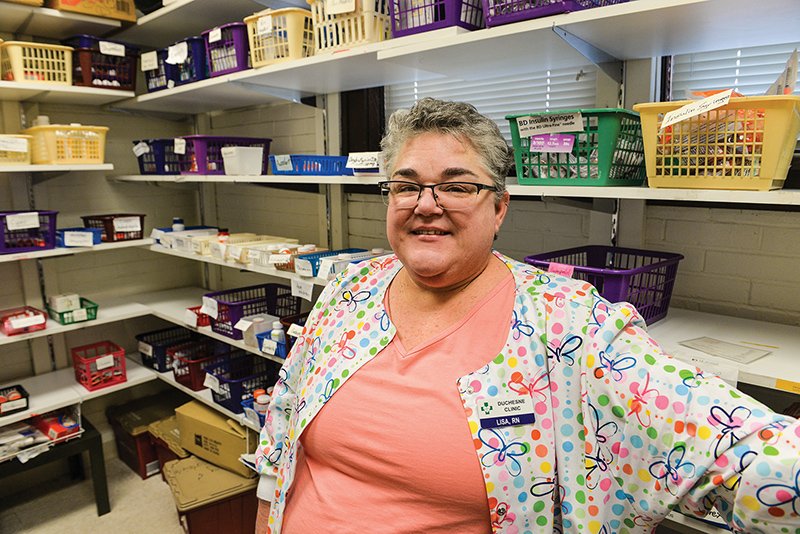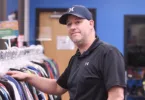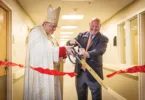
Lisa Bara, RN, Duchesne Clinic’s nurse manager, orders donated medications twice a month from the state’s Unused Medications Repository. These are given to Kansans who can’t afford health care — including medications. LEAVEN PHOTO BY JOE BOLLIG
by Joe Bollig
joe.bollig@theleaven.org
KANSAS CITY, Kan. — What would Trudy Taylor do without the donated medicines she receives at Caritas Clinics?
“I may not be alive, because my blood sugars were really uncontrolled,” she said. “It’s lifesaving for me to have my insulin provided by St. Vincent Clinic (in Leavenworth) and other medications, too.”
Taylor is not alone.
Independently operated safety net clinics serve more than 261,000 Kansans annually who otherwise would be forced to do without health care because they can’t afford it — including medications.
Trudy and her husband Steven Taylor were at the Duchesne Clinic in Kansas City, Kansas, on March 8 to be part of a celebration honoring OptumRX, a pharmacy care services company that has donated $22 million in prescription medications.
Duchesne Clinic and St. Vincent Clinic comprise Caritas Clinics, Inc., affiliates of the SCL Health System, founded by the Sisters of Charity of Leavenworth.
OptumRX, which employs more than 2,500 people in Overland Park and the Greater Kansas City area, has donated the medications since 2009 through the Kansas Unused Medication Donation Program.
OptumRX pharmacist Tim Reel is credited with the genesis of this lifesaving program.
“We’re very excited about this program and innovation,” said OptumRX CEO John Prince at a press conference. “It has to do with one idea of an employee and how it impacts thousands of people.”
That one employee — Reel — asked if there wasn’t something better they could do with returned, unused medications other than discard them.
Reel and others worked with now Sen. Kay Wolf and Sen. Vicki Schmidt to help get the Unused Medications Act passed in 2008. The act was amended in 2011.
“This law allows OptumRX to donate unused medications to safety net clinics and federally qualified health centers,” said Prince.
Today, Duchesne and St. Vincent clinics are among the 38 participating clinics that distribute the free medications to their patients.
Governor Jeff Colyer — a state representative when the legislation was passed — thanked OptumRX for its donations, Reel for his advocacy and Caritas Clinics for their vital work.
Back in 2008, legislators didn’t know state regulations prevented such beneficial donations and, in fact, required that they be discarded.
“It took the power of a Kansan, the power of people in this room, to come together to show how we could fix this,” said Colyer. “And, so, the colleagues at OptumRX came to us, visited with us and really started to tell that story.
“We can’t really count the number of thousands of Kansans’ lives that this has changed, but I also want you to think about the hundreds of thousands of lives it will change over the long run.”
One peek in Duchesne Clinic’s pharmacy supply room shows the importance of donations by OptumRX.
Lisa Bara, Duchesne Clinic’s nurse manager, orders donated medications twice a month from the state’s Unused Medications Repository.
The repository is administered by, and located at, the Community Health Center of Southeast Kansas in Pittsburg. The program operates under the management of the Kansas Department of Health and Environment.
What does it mean to the clinic and its patients to get these free medications?
“It means everything,” said Bara. “With what we’re able to order, we’re not only able to stock our medication room with medications for patient use, but we’re also able to order medications on a routine basis for particular patients.”
One such person was a kidney transplant patient who came to the clinic with only a 30-day supply of medications necessary to prevent her body from rejecting the kidney.
Bara was able to order what she needed then and consistently for the past year. The donated medications literally saved that person’s life.
“The majority of our medications come to us in bottles like this,” said Bara, holding a bottle with an orange cap. “The majority of the meds we receive from the repository are donated by OptumRX.”






